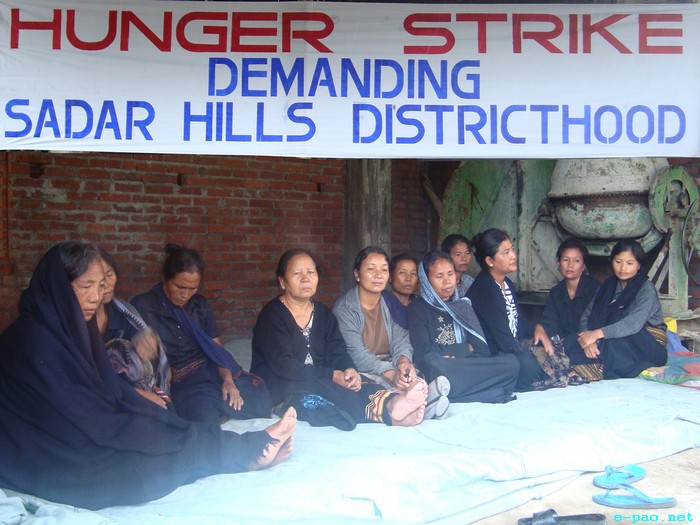Hunger Strike in India That Needs World Attention
By Nehginpao Kipgen *

Hunger strikers demanding for Sadar hills Districthood at Kangpokpi on August 25 2011 - Picture Credit :: Kamboi
It is uncommon here in the United States to see a peaceful demonstration, in the form of hunger strike that is spearheaded by women activists for a genuine cause they firmly believe in.
The news may sound somewhat unconvincing, but it is happening in the state of Manipur in Northeast India. It may be difficult to find someone who does not know India, even if he or she is unsure of its precise geographical location in the world map. India boasts for its diversity and being the world's largest democracy, with a population of over 1.21 billion people.
India is a nation originally formed by princely states and territories. It is also a country which fought several decades to gain independence from the British in 1947. Mohandas Karamchand Gandhi (popularly known as Mahatma Gandhi) was a pioneering leader who stood up against the British forces with an effective political weapon called ahimsa (meaning non-violence).
It was Gandhi's use of non-violent strategy that has left indelible imprints in the hearts and minds of many Indians. If so, why has similar non-violent agitation seemingly become unimportant, if not irrelevant, in the state of Manipur?
In a genuine demand for the upgradation of Sadar Hills Autonomous District Council into a full-fledged district, more than 40 women belonging to the Kuki community, began their fast unto death on August 16. To further protest the government's inaction, the people of Sadar Hills observed India's independence day (August 15) in mourning by wearing black dresses.
On August 28, three hunger strikers were arrested by the state police on charges of attempting to commit suicide, after they refused medical aid. Earlier on August 20, seven hunger strikers were hospitalized because of deteriorating health condition. As part of their agitation, elected representatives of Sadar Hills have met both the state and central governments. While the central government has advised the state government to look into the agitators' demand, the state government fails to implement it thus far.
The agitation was initially planned for a seven-day strike starting July 31, but it escalated to an indefinite strike with the death of three women on August 2. They were mowed down by a tanker, whose driver lost control. Unfortunately, this extreme form of peaceful agitation (i.e. hunger strike) has thus far failed to capture headlines in the Indian mainstream media, not to mention the international media. It has also failed to draw the attention of leading international human rights organizations, such as Human Rights Watch and Amnesty International.
Given the seriousness of the situation, the dearth of publicity is surprising. Whether the Indian general public approves or disapproves of the demand is up to the readers concerned. However, leading newspapers and magazines should cover agitations such as this which involve life and death of ordinary citizens. Sadar Hills' demand is not something new. It has been mandated by the Indian Parliament Act in 1971. Of the six autonomous hill districts constituted in 1972, only Sadar Hills remains to be officially accorded a full-fledged district status.
Among others, the Indian president, prime minister, home minister and the opposition leader have been officially apprised of the renewed demand, which successive Manipur governments had given verbal assurances but failed to implement them. However, giving a mere advice to the state government without any concrete action is inadequate.
An indifference to such burning issue can generate criticisms and apprehensions from around the world. More importantly, Manmohan Singh-led Indian National Congress government should pay close attention to the non-violent agitation, which Gandhi and other Indian freedom fighters used against the British. The government has responsibility to protect the lives of all its citizens, regardless of ethnicity, race, religion, and location.
Since the ongoing Sadar Hills agitation primarily falls under the state's domain, Manipur Chief Minister Okram Ibobi Singh should explore all possible means to end over a month-long political crisis at the earliest possible. Meanwhile, the people of ethnically-sensitive Manipur should abstain from dragging the issue of ethnicity in this political game. Administrative convenience being the reason for Sadar Hills demand, it must not be viewed otherwise.
Moreover, the people of Manipur needs to learn the beauty of diversity, while respecting the rights of every citizen. To achieve this goal, the gap (in terms of per capita income) between the hills and the valley people should be bridged. Unless there is equality of distribution, people will be hesitant to share equal responsibility.
Human rights organizations such as National Human Rights Commission of India and National Commission for Minorities should assess the condition of the hunger strikers and extend any possible help. Human rights campaigners around the world should speak up for these voiceless peaceful hunger strikers.
The international community must ensure that the lives of peaceful hunger strikers in India are not jeopardized for a legitimate political demand, and their fundamental rights should be protected. In this regard, pressure must be put on both the Indian and Manipur governments to take necessary steps.
The article was first published in the at:
Asian Tribune
|
* Nehginpao Kipgen is a political analyst and general secretary of the U.S.-based Kuki International Forum (www.kukiforum.com). His works have been widely published in five continents - Asia, Africa, Australia, Europe, and North America. He can be reached at nehginpao(at)gmail(dot)com. This article was webcasted on September 06, 2011 .
* Comments posted by users in this discussion thread and other parts of this site are opinions of the individuals posting them (whose user ID is displayed alongside) and not the views of e-pao.net. We strongly recommend that users exercise responsibility, sensitivity and caution over language while writing your opinions which will be seen and read by other users. Please read a complete Guideline on using comments on this website.








